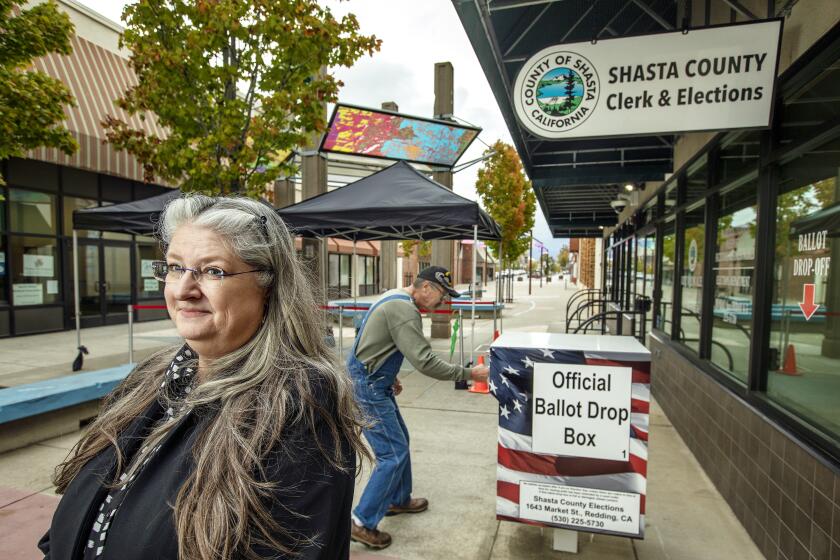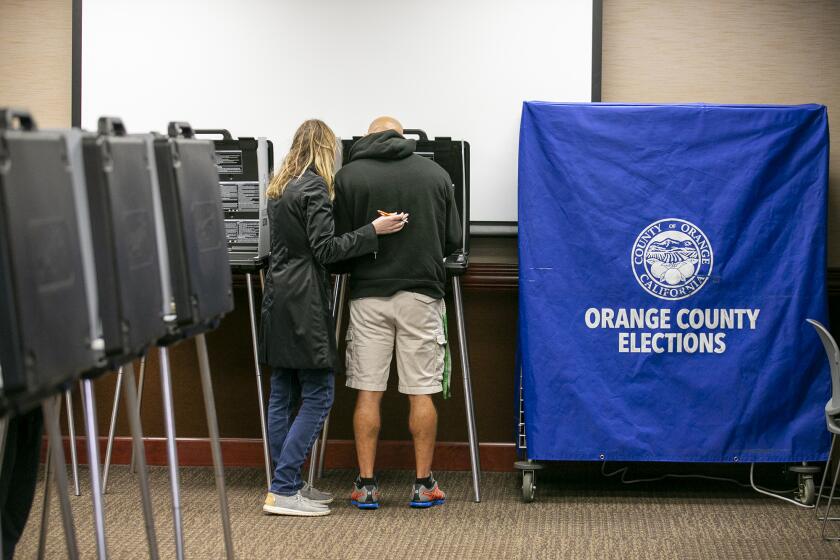Many O.C. residents deny Trump election results, potentially swaying key races, poll finds

- Share via
Alex Lopez doesn’t contest that Joe Biden was elected president in 2020.
His concern lies with how those results came to be.
“By the numbers? He absolutely won it. Ethically? Probably not,” said the 38-year-old Anaheim resident, who works as a logistics coordinator.
Questions about the integrity of the election process have been stoked nationally for years, in large part because of former President Trump’s claims that victory was stolen from him.
The same goes for Orange County, where 26% of adults surveyed in a UC Irvine poll released this month said they did not believe Biden legitimately won the presidency in 2020, with another 17% unsure about the question.
In a purple county with several key races that could help determine the balance of power in Congress, these doubts could cause voters to stay home in November — particularly conservative voters.
A majority of the O.C. Republicans surveyed for the poll — 55% — thought Biden had not won fairly, while most Democrats — 88% — believed the election results.
A majority of people surveyed who aren’t members of either party said Biden won legitimately. However, 23% said he didn’t, and the same percentage didn’t know.
“Distrust in the election system may very well convince some people not to participate, and what we’re seeing is that people who distrust it more tend to skew to the right, and so that would hurt Republicans,” said Jon Gould, dean of the UCI School of Social Ecology, who spearheaded the poll.
Shasta County ditched its Dominion voting machines based on unfounded claims of fraud. The state then banned hand-counting ballots.
The issue has played out locally in Huntington Beach, a longtime GOP stronghold that in recent years — along with the rest of the county — has grown more politically and demographically diverse. This has led to friction among residents and politicians with opposing political views.
In March, voters approved a measure allowing the city to require that voters show government-issued photo identification, beginning in 2026.
Huntington Beach Councilman Tony Strickland and Mayor Gracey Van Der Mark wrote in support of the ballot measure that voters “deserve the right to know that our elections are secure.”
“It is crucial for our democracy that voters have faith in our election results. That trust in the outcome of elections comes into question when we can’t always be certain who is voting,” they wrote.
California law requires residents to verify their identities when they register to vote and imposes criminal penalties for fraudulent registration. The state does not ask for photo identification at the polls, but voters are required to provide their names and addresses.
This month, California sued Huntington Beach over its new law. Atty. Gen. Rob Bonta said during a news conference that the photo identification requirement “is not only misguided — it is blatantly and flatly illegal.”
Election skepticism in O.C. may be lower than in some other parts of the country. In a national poll conducted by the Washington Post and the University of Maryland last December, 36% of respondents said Biden’s victory was not legitimate.
But in the highly competitive Orange County congressional races, particularly the 47th and 45th districts, where a few votes could sway the outcome, the repercussions could be far-reaching.
In the 45th District, Democrat Derek Tran is challenging incumbent Republican Rep. Michelle Steel. In the 47th District, which runs largely along the coast, Democrat state Sen. Dave Min and Republican Scott Baugh are facing off to replace Democratic Rep. Katie Porter.
As for the presidential rematch between Biden and Trump, there is little suspense in California because of its deep blue population in urban areas.
Still, Trump asserted in a speech at the GOP California Convention in Anaheim last year that “we would win California in a general election if they didn’t have a rigged voting system.” He alleged that people are getting five or six ballots mailed to them.
“Nobody knows where they’re going, who they’re going to, who signs them, who delivers them and who the hell counts them? Nobody knows,” he said.
Democrats and legal experts warn how the lawsuits in multiple states might overwhelm election officials and undermine voter confidence in the balloting results.
The widespread use of vote-by-mail ballots, which began during the pandemic and has remained popular, has altered the pattern of vote counting as results trickle in, fueling beliefs that something nefarious is afoot.
“Trump was winning on election night, and then as more and more votes were counted, he began to lose, and that looks to some people like someone’s been tweaking the election results, as opposed to people for the first time being exposed to vote by mail,” Gould, of UCI, said.
Orange County Registrar of Voters Bob Page started conducting open tours of the ballot counting operation in Santa Ana during the 2022 midterms in an effort to show people the process and alleviate concerns.
But election skepticism and allegations of a “rigged” voting system have persisted.
The voter ID lawsuit is the latest clash between California and the conservative town, which has thrust itself into the U.S. culture wars and the crosshairs of state officials.
The economy, abortion, foreign policy and immigration remain top issues for Orange County voters this cycle, according to the UC Irvine poll. The economy is among the top issues for both Democrat and Republican voters.
Democrats rank abortion as the third most important issue, behind checking a Trump presidency from “going too far” and the economy. Republicans rank the economy and situation at the border as their first and second most important issues.
Lopez, who is a nonaffiliated voter, said he worries about issues like ballot harvesting — particularly affecting people who might be susceptible to outside pressure — that he fears could skew election results.
He also has concerns about the “motor voter” system, in which Californians applying for or updating a driver’s license are automatically registered to vote, unless they opt out. In 2018 — the year the system rolled out in California — roughly 1,500 people, including noncitizens, were wrongly registered to vote.
“I would love to hear the government and states come out and say, ‘Hey, you know what, these are the concerns from a lot of people, and we’re going to put some stopgaps in there,’” Lopez said.
Lopez, who ranks the economy as a top issue, still plans to vote. He is still researching candidates in all the races but said he’s leaning toward Trump for president.
Others disillusioned with the voting process might choose to sit this one out.
“By selling doubts in the election, there is an interesting question as to whether Republicans and Trump in particular are sowing the seeds for their own defeat,” Gould said.
More to Read
Sign up for Essential California
The most important California stories and recommendations in your inbox every morning.
You may occasionally receive promotional content from the Los Angeles Times.














